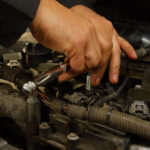Electric vehicles (EVs) have rapidly gained popularity in the U.S., and Kia has positioned itself as a key player in the EV market with models like the Kia EV6 and Niro EV. One of the most common questions potential buyers ask is: “How long does a Kia EV battery last?” In this blog, we’ll explore the longevity of Kia EV batteries, the factors that affect their lifespan, and how you can maximize battery performance.
Kia EV Battery Longevity
Kia EV batteries are designed to last for the long haul. On average, the lithium-ion batteries used in Kia electric vehicles can last between 8 to 10 years or 100,000 miles before experiencing significant degradation. To back this up, Kia offers a 10-year/100,000-mile warranty on its EV batteries, which provides peace of mind for EV buyers.

What Happens as the Battery Ages?
Like all rechargeable batteries, Kia EV batteries will experience some degradation over time. This means that as your EV gets older, the battery will gradually hold less charge, resulting in a slight reduction in range. However, most Kia EV batteries are expected to retain at least 70% to 80% of their original capacity even after several years of use.
Factors That Affect EV Battery Life
While Kia EV batteries are engineered for longevity, several factors can influence how long the battery will last:
- Charging Practices: Regularly charging your EV to 100% or letting it drain to 0% can put strain on the battery. Ideally, it’s best to keep your charge level between 20% and 80% for everyday driving.
- Extreme Temperatures: Cold weather can temporarily reduce range and slow charging speeds, while excessive heat can degrade the battery over time. If possible, park your EV in a garage or shaded area during extreme weather conditions.
- Fast Charging: While convenient, frequent use of DC fast chargers can accelerate battery wear. Using a Level 2 charger for daily charging needs can help extend battery life.
Can You Extend the Life of Your Kia EV Battery?
Yes, there are a few key steps you can take to maximize the lifespan of your Kia EV battery:
- Avoid Full Charges and Discharges: Try not to let your battery reach 0%, and avoid charging it to 100% unless necessary for long trips.
- Limit Fast Charging: Use fast chargers sparingly and rely on slower home charging when possible.
- Drive Regularly: Regular use helps keep the battery cells active and in good condition.
- Keep Your Software Updated: Kia regularly releases updates that can improve battery management and optimize performance, so staying on top of these updates is essential.

Taking Care of Your Battery Health
Kia EV batteries are designed to offer years of reliable performance, making them an excellent option for eco-conscious drivers. By following best practices for charging and maintaining your EV, you can ensure that your Kia battery lasts as long as possible, providing a sustainable and cost-effective driving experience. Whether you’re commuting or road-tripping across the U.S., Kia’s commitment to quality and innovation ensures that their EV batteries will meet the demands of American drivers for years to come.
FAQs
1. How often should I charge my Kia EV battery?
It’s recommended to charge your Kia EV battery regularly, especially if it’s below 20%. However, charging it to 80% instead of 100% daily can help extend the battery’s lifespan.
2. What factors can reduce an EV battery’s life?
Factors such as extreme temperatures, frequent fast charging, and aggressive driving can reduce the overall lifespan of your EV battery.
3. Does Kia offer a warranty on EV batteries?
Yes, Kia typically offers a warranty for their EV batteries, often covering up to 8 years or 100,000 miles, ensuring peace of mind for EV owners.
4. Can an EV battery be replaced?
Yes, if necessary, an EV battery can be replaced. However, with proper care and usage, it should last for many years before needing replacement.
5. How can I maximize the life of my Kia EV battery?
To extend your Kia EV battery’s life, avoid full charging and deep discharges regularly, limit fast charging, and park your vehicle in moderate temperatures.
















